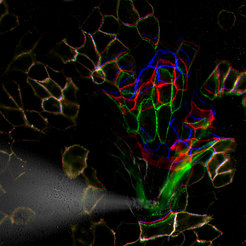How skin cells protect themselves against mechanical stress

The molecular force transduction in desmosomes was analyzed before (blue), during (green), and after (red) the application of mechanical stress.
Skin cells cling together
Our skin acts as a protective shield against external factors. To carry out this mechanical function, skin cells form special anchoring points known as desmosomes, which increase the adhesion between cells. It is know that patients with defective desmosomes suffer from severe skin disorders, especially following mechanical stress, but it is still unclear how mechanical forces are processed on the molecular level in desmosomes. An international research group headed by Carsten Grashoff, Research Group Leader at the Max Planck Institute of Biochemistry and Professor at the University of Münster, has developed a new method to investigate the molecular forces at these anchoring points.
Miniature spring scale measures forces in desmosomes
“The technology works similar to a miniature spring scale,” says Anna-Lena Cost, a lead author of the study. The force sensor consists of two fluorescent dyes that are linked by an extensible peptide. The peptide acts as a molecular spring, which stretches in response to just a few piconewtons of force, resulting in fluorescence changes. These changes can be recorded with microscopy methods to determine mechanical differences at desmosomal proteins. In their experiments, the researchers found that desmosomes do not experience mechanical stress, as long no external forces are applied. When the cells are mechanically stressed, as it is the case in our skin, mechanical forces within desmosomes becomes visible. These forces depend on the strength of the exerted stress and its orientation. “If there is little mechanical stress, other cellular structures are able to bear the load. However, when high levels of stress occur, desmosomes come to the rescue,” summarizes Anna-Lena Cost.
Originalpublikation:
Price, J. A.; Cost, A. L.; Ungewiß, H.; Waschke, J.; Dunn, A. R.; Grashoff, C. Mechanical loading of desmosomes depends on the magnitude and orientation of external stress. Nature Communications (2018).
DOI: 10.1038/s41467-018-07523-0.




